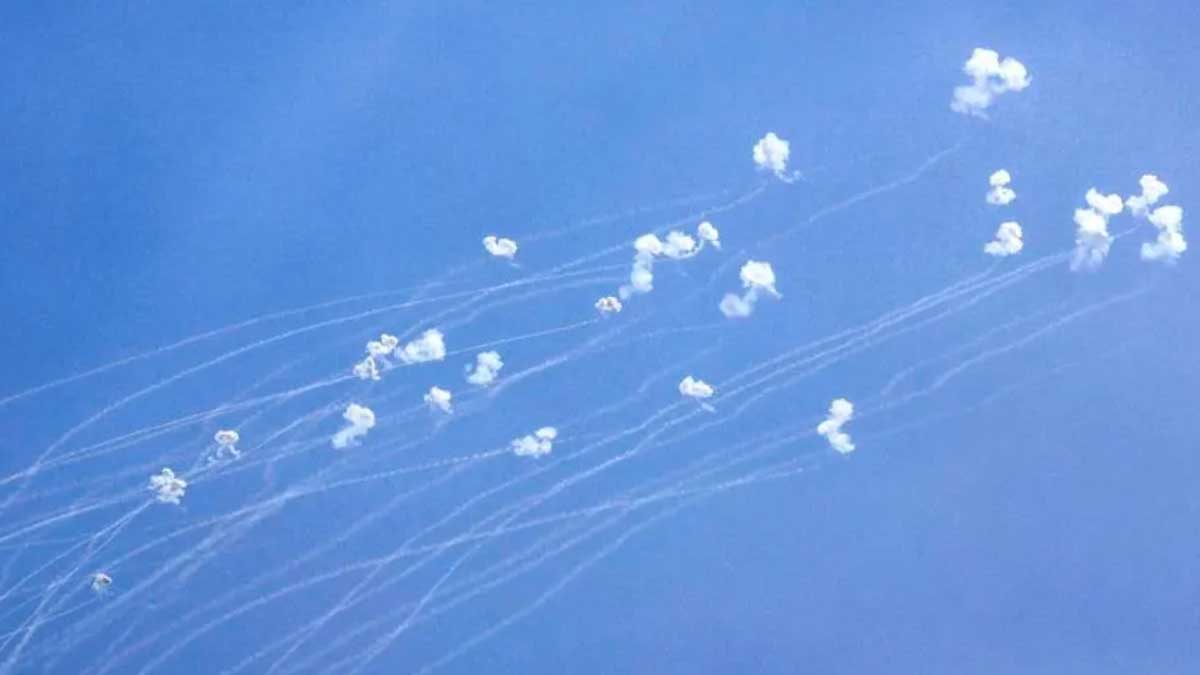- Home
- Billionaires
- Investing Newsletters
- 193CC 1000
- Article Layout 2
- Article Layout 3
- Article Layout 4
- Article Layout 5
- Article Layout 6
- Article Layout 7
- Article Layout 8
- Article Layout 9
- Article Layout 10
- Article Layout 11
- Article Layout 12
- Article Layout 13
- Article Layout 14
- Article Sidebar
- Post Format
- pages
- Archive Layouts
- Post Gallery
- Post Video Background
- Post Review
- Sponsored Post
- Leadership
- Business
- Money
- Small Business
- Innovation
- Shop
Recent Posts
Israel Intercepts Hezbollah Missile Amid Rising Tensions

Hezbollah fired a missile at Tel Aviv on Wednesday in what marks the militant group’s deepest strike into Israeli territory to date. This attack is part of an ongoing escalation in tensions between the two sides, with Israel’s military quickly intercepting the missile to prevent casualties and damage. The Iranian-backed Hezbollah group claimed that the missile targeted the headquarters of Mossad, Israel’s intelligence agency, in retaliation for the recent killings of several of its leaders and an attack last week that involved exploding pagers, which claimed the lives of at least twelve people. This development has raised concerns about the possibility of the conflict spiraling into a wider regional war.
Israel’s defense systems responded promptly, triggering air raid sirens across Tel Aviv, which is considered the financial hub of the country. Millions of residents scrambled to take shelter in response to the missile launch. According to Israeli military officials, the missile was intercepted before it could hit its intended target. In retaliation, the Israeli Defense Forces (IDF) launched a counterstrike against Hezbollah positions in southern Lebanon, specifically targeting the area from where the missile had been fired.
Nadav Shoshani, a spokesperson for the Israeli military, took to social media to condemn Hezbollah’s actions, stating that the missile attack put millions of innocent civilians at risk and forced them to seek refuge. He also dismissed Hezbollah’s claims that Mossad headquarters was the target, stating that the intelligence agency’s headquarters is not located in Tel Aviv.
A few hours later, Hezbollah launched additional attacks, claiming to have fired tens of rockets toward two key targets in Israel—the town of Hatzon in central Israel and the Dado military base in the northern region. The attack on the Dado base resulted in property damage, though there were no immediate reports of injuries. In response, the Israeli military carried out another round of airstrikes, with “extensive” strikes launched into Hezbollah-controlled areas of southern Lebanon and the Beqaa Valley in eastern Lebanon.
The fallout from these airstrikes was severe. Lebanese state media reported that at least three people were killed, and nine others were injured by Israeli airstrikes in the town of Maaysrah, which lies north of the capital Beirut. This incident is part of a larger pattern of escalating violence between Israel and Hezbollah, with each side responding to the other’s actions in a cycle of strikes and counterstrikes.
The missile attack on Tel Aviv is the latest incident in a broader and increasingly tense conflict between Israel and Hezbollah. The Iran-backed group, which is designated as a terrorist organization by Israel, the United States, and other countries, has been involved in intermittent clashes with Israeli forces for years, but the recent wave of violence marks a significant escalation. Just days before the missile launch, Israel began a series of extensive aerial bombardments targeting Hezbollah strongholds in southern Lebanon. This offensive came after a series of smaller operations the previous week and was described by Israeli officials as one of the most comprehensive military campaigns against Hezbollah in recent years.
The situation on the ground has grown increasingly dire for Lebanese civilians, many of whom have been caught in the crossfire. The IDF issued warnings to civilians living in Hezbollah-controlled areas in southern Lebanon, urging them to evacuate to avoid being harmed in the ongoing military operations. Despite these warnings, Israel’s strikes have resulted in a growing number of civilian casualties and mass displacement. Hundreds of civilians have died as a result of the airstrikes, and tens of thousands have been forced to flee their homes, seeking refuge in the relatively safer northern parts of Lebanon or in Beirut.
Israeli leaders, including Prime Minister Benjamin Netanyahu, have defended the military campaign, arguing that it is necessary to dismantle Hezbollah’s military capabilities and prevent further rocket attacks on Israeli territory. Netanyahu has emphasized that the strikes are also intended to create a secure environment that will allow Israeli civilians who fled the north to return to their homes. However, the international community has expressed concerns about the potential for the conflict to escalate further, particularly if the violence spills over into other countries in the region.
The intensifying conflict has attracted the attention of world leaders, many of whom have called for de-escalation. U.S. President Joe Biden, speaking at the United Nations General Assembly on Tuesday, urged both sides to exercise restraint and warned that a full-scale regional war would not be in anyone’s interest. Biden stressed that diplomacy must be the path forward and cautioned against actions that could further destabilize the Middle East.
Despite these calls for restraint, Israel has shown no signs of slowing down its military campaign. Israeli officials have stated that their primary objective is to neutralize Hezbollah’s military infrastructure, which they view as a direct threat to the security of northern Israel. The Israeli military has also made it clear that it will continue to target areas in southern Lebanon that are known to be used by Hezbollah for military purposes, regardless of the presence of civilians.
In Lebanon, the government has voiced frustration with the international response to the conflict. Speaking at an event in New York on Tuesday, Lebanon’s Foreign Minister Abdallah Bou Habib criticized President Biden’s remarks, stating that they lacked strength and failed to offer a solution to Lebanon’s ongoing struggles. He stressed that the United States, as a global superpower, has the ability to influence events in the Middle East but has not taken sufficient action to address the crisis in Lebanon.
The death toll from the recent Israeli strikes has risen to at least 558 people, according to Lebanese authorities. Among the dead are 50 children and 94 women, highlighting the devastating impact the conflict is having on civilians. The ongoing violence has also left large swaths of southern Lebanon in ruins, with many villages either partially or completely destroyed by Israeli airstrikes.
As the conflict between Israel and Hezbollah intensifies, the risk of further escalation looms large, with many fearing that the situation could spiral into a full-blown regional war involving other Middle Eastern countries.
Recent Posts
Categories
- 193cc Digital Assets2
- 5G1
- Aerospace & Defense46
- AI37
- Arts3
- Banking & Insurance11
- Big Data3
- Billionaires449
- Boats & Planes1
- Business328
- Careers13
- Cars & Bikes76
- CEO Network1
- CFO Network17
- CHRO Network1
- CIO Network1
- Cloud10
- CMO Network18
- Commercial Real Estate7
- Consultant1
- Consumer Tech180
- CxO1
- Cybersecurity68
- Dining1
- Diversity, Equity & Inclusion4
- Education7
- Energy8
- Enterprise Tech29
- Events11
- Fintech1
- Food & Drink2
- Franchises1
- Freelance1
- Future Of Work2
- Games141
- GIG1
- Healthcare78
- Hollywood & Entertainment186
- Houses1
- Innovation42
- Investing2
- Investing Newsletters4
- Leadership65
- Lifestyle11
- Manufacturing1
- Markets20
- Media193
- Mobile phone1
- Money13
- Personal Finance2
- Policy567
- Real Estate1
- Research6
- Retail1
- Retirement1
- Small Business1
- SportsMoney33
- Style & Beauty1
- Success Income1
- Taxes2
- Travel10
- Uncategorized8
- Vices1
- Watches & Jewelry2
- world's billionaires418
Related Articles
Trump Moves $4B Stake in Truth Social Parent, Stock Drops 6%
Donald Trump recently transferred his 57% stake in Trump Media & Technology...
By 193cc Agency CouncilDecember 20, 2024House Rejects Trump-Backed Funding Bill, Shutdown Looms
The U.S. House of Representatives rejected a new government funding bill on...
By 193cc Agency CouncilDecember 20, 2024Trump Named Time’s Person of the Year for Second Time
On Thursday, Time magazine honored Donald Trump as its “Person of the...
By 193cc Agency CouncilDecember 12, 2024Meta Donates $1 Million to Trump’s Inaugural Fund
Meta, the parent company of Facebook and Instagram, has confirmed a $1...
By 193cc Agency CouncilDecember 12, 2024















Leave a comment